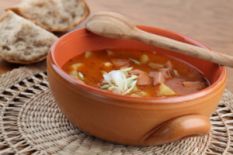You will at best hear something about its French origin, its importance on red letter day tables, and perhaps a little argument whether cucumbers in the salad should be fresh or brined…
The actual story is a bit different, to say the least. When Lucien Olivier, a French cook of Belgian origin, united his efforts with the Russian merchant Yakov Pegov and opened Hermitage, the venue became one of Moscow’s most celebrated restaurants by the middle of 1860s. Yet the eatery lacked something, and Lucien soon realised what exactly – a signature recipe, and not just the Olivier family version of mayonnaise. On one occasion, the cook served his altered sauce under the name of “game mayonnaise”, featuring grouse, partridge, crawfish tails, caviar, and veal tongue, among other ingredients. In the centre of the salad portion, there was a little mountain of chopped boiled potatoes, pickling cucumbers, and boiled eggs, which, according to Lucien Olivier, was no more than a decoration. However, some of the clients tried mixing the dish’s ingredients, so the cook did just the same and covered it lavishly with his family version of mayonnaise, thus making the salad much closer to the mysterious Russian soul…
As strange as it seems, there was no recipe of Olivier salad officially recorded by its inventor, so the so called “original 1904 recipe” is simply a recreation made by one of the Hermitage regulars. After all, Lucien Olivier left this world in 1883. At the turn of the 20th century, one of the legendary cook’s sous-chefs, Ivan Ivanov, tried to steal the salad’s recipe, albeit without much success, largely due to a failure in recreating the sauce. In 1905, the successors to Lucien Olivier sold his business, though Hermitage operated until 1917, when the Bolsheviks destroyed anything resembling civilisation in the Russian Empire.

Despite various challenges (two world wars, collectivisation, Stalinism, and so on), the legendary salad has survived the troubled twentieth century, albeit with considerable changes in the ingredients, mainly due to their cost. Currently, the “obligatory” components of Olivier salad are boiled potatoes, pickled or brined cucumbers, peas, eggs, carrots, onions, and bologna sausage, lavishly dressed with mayonnaise.
There has been a lot of speculation recently about recreating the original Olivier salad recipe. With all due respect, I am a bit sceptical about it. First of all, even the so-called “original 1904 recipe” is simply based on vague memories of a Hermitage regular, recorded over two decades after Lucien Olivier’s death. Besides, think of the cost of such ingredients as grouse, partridge, crawfish tails, veal tongue, and especially beluga caviar. Hardly an affordable dish, is it? If you have the chance to pop into Za Dvoma Zaytsyamy restaurant on Kyiv’s Andriyivsky Uzviz, I suggest you take your pick and choose between the two versions of Olivier salad, either with salmon or chicken, but home-made mayonnaise is guaranteed…






